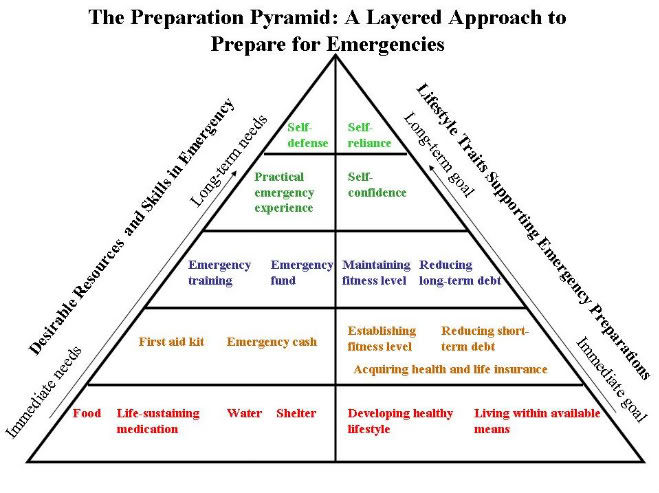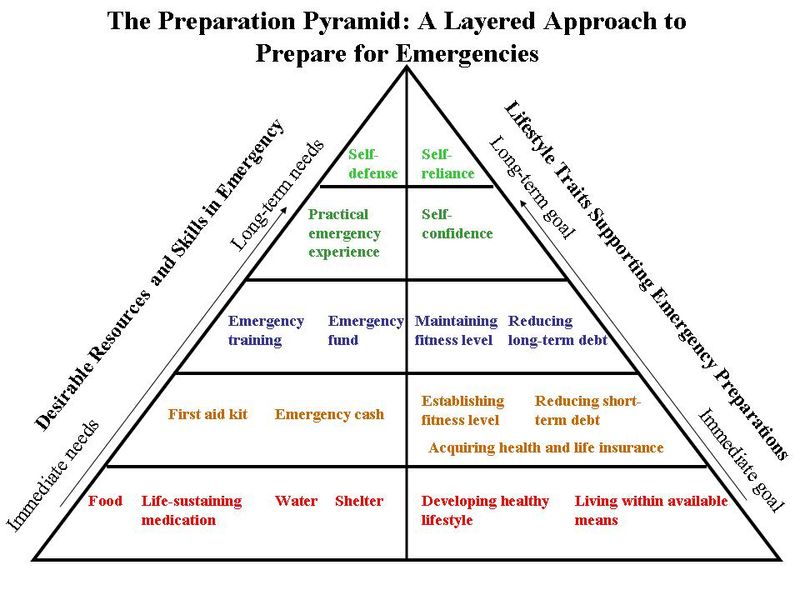Goal: Highlight in a simple graphic one approach to preparation priorities for people new to emergency preparedness or those reevaluating ongoing efforts. 
(larger graphic which requires scrolling included below)
After searching here and Google and finding no simple graphic prioritizing steps to prepare for an emergency or disaster, I opted to design a basic graphic just in time to honor the now-defunct food pyramid.
This pyramid is based in part on my understanding of preparations and several insightful observations of several others (included below). It highlights that taking basic steps as part of a balanced lifestyle are central to many kinds of emergency preparations. This tries to capture in a straightforward way that day-to-day living and habits are as important to emergency preparations as the latest bug out bag or hi-tech knife (which
do have their place in preparation).
Overview: how to read The left side highlights
one possible view of how to prioritize steps to prepare specifically for an emergency.
The right side highlights some steps not always considered relevant to emergency preparations, but which have benefits in every day circumstances as well as in emergency or disaster situations, whether they be for a few hours, days, or longer.
Breakdown: the layered approachThis approach emphasizes that basic necessities
most likely to be needed in an emergency should come first. Paralleling these necessities are basic steps to improve the ability of an individual, family, or group to help or survive in an emergency.
The premise of this layered approach focuses on a mix of what is most important to survival in an emergency and the most likely threats facing an individual or family. Most people are far more likely to face personal ruin through crippling personal debt, poor health, or imbalanced planning instead of through a horde of scavengers; however, that
does not mean that adequate planning, training, or personal security are not relevant.
Limits:This simple graphic is intended to help people prioritize and evaluate their efforts. It therefore specifically and intentionally omits any lists of what to included in a bug out bag, bug out vehicle, or a bug out location.
Insightful posts: a few specific ideas that I am attempting to capture here
Edit: added names to give credit to individuals (if any poster believes I took their text out of context, I will remove it if you let me know)
Hydrostatic wrote:
Untill now, my preps have been centered around dealing with civil distress and disease outbreak. After two weeks of putting my preps through hard use, I have found that I was lacking in many areas. One problem that I ran into, was that I had devoted to much of my resources to self defense. While having an AR15 and enough ammo to hold off a small army, provides myself with a sense of security to no end, it holds little practicality in the situtaions that I am most likely to be in.
One of the things that I found was needed most was extra medical supplies. After two days of clearing debris, I had already burned through my basic FAK. Between dozens of cuts recieved from routine work, and my friend suffering an allergic reaction from a bee sting, the only medical crysis I could take on was premenstraul cramps. (read more at
viewtopic.php?f=6&t=79870#p1760084)
tarafore wrote:
For someone in this situation, the best prep is debt reduction, creating an emergency fund, and achieving financial stability. This isn’t really that compatible with $1,000 rifles, $600 pistols, thousands of dollars worth of ammunition, range fees, etc. (read more at
viewtopic.php?f=108&t=80088)
WhoShotJR wrote:
...Approaching preps like a ladder, taking one step at a time. Imagine the whole ladder as your total prep goals, with each step representing 5% of each individual goal. You have a twenty rung ladder in front of you to climb, each one a well defined step. (read more at
viewtopic.php?f=6&t=70736)
Vel454 wrote:
I believe a financial crisis is the most likely disaster that an individual family could experience, and I believe with that, it should be the disaster you should most diligently prepare for…(read more at
viewtopic.php?f=6&t=81082)
MikeDoyle wrote:
The thrust of the article is that we tend to rationalize our way into irrational decisions about our exposure to hazards. (read more at
viewtopic.php?f=6&t=77149)

As usual, if you have reads this far, you have some right to critique this.


 As usual, if you have reads this far, you have some right to critique this.
As usual, if you have reads this far, you have some right to critique this.





